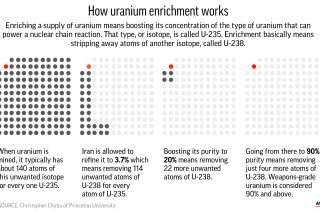AP EXPLAINS: Science of uranium enrichment amid Iran tension

Corrects headline; graphic shows the same centrifuge technology used to reach 3.6 percent can be used to drive enrichment to 90 percent.;
NEW YORK (AP) — Iran has quadrupled its production of low-enriched uranium, semi-official news agencies reported Monday, just days after saying it would resume higher levels of enrichment if world powers do not repair the nuclear accord following the U.S. withdrawal from it last year.
The semi-official Fars and Tasnim news agencies say the increased production is of uranium enriched to 3.67%, enough for civilian applications and nowhere near the 90% needed for nuclear weapons. But a quadrupling of production would mean that Iran likely will go beyond the stockpile limitations set by the deal.
Higher enrichment would mean exceeding the level of potency allowed by the 2015 nuclear agreement with world powers. Tehran is threatening to resume higher enrichment on July 7 if no new agreement is reached to provide relief from U.S. sanctions.
Enriching a supply of uranium means boosting its concentration of the type of uranium that can power a nuclear reaction. That type, or isotope, is called U-235. Enrichment basically means stripping away atoms of another isotope, called U-238.
When uranium is mined, it typically has about 140 atoms of this unwanted isotope for every atom of U-235, notes Christopher Chyba of Princeton University. Refining it to a purity of 3.67%, the level now allowed by the nuclear deal, means removing 114 unwanted atoms of U-238 for every atom of U-235.
Boosting its purity to 20% means removing 22 more unwanted isotopes per atom of U-235, while going from there to 90% purity means removing just four more per atom of U-235, he noted.
So once one achieves 20% purity on the way to 90%, “you’re most of the way there already,” Chyba said.
Iran’s Supreme Leader Ayatollah Ali Khamenei reportedly said last week that achieving 20% “is the most difficult part ... The next steps are easier than this step.” Iran is not known to have enriched beyond 20% previously.
Matthew Bunn at Harvard’s John F. Kennedy School of Government said the same centrifuge technology used to reach 3.67% can be used to drive enrichment to 90%.
Once Tehran had enough uranium enriched to 20%, it would only be weeks away from a bomb if it decided to build one, he said. A bomb’s worth of highly enriched uranium “could be the size of a very large grapefruit,” Bunn said.
Iran says it has never sought nuclear weapons. But Western officials and experts say that prior to the nuclear deal, Iran had a breakout capability of just a few months if it were to decide to build a bomb. The Obama administration, which negotiated the deal, said it extended that breakout period to one year or more, giving Western powers more time to detect any such decision and respond to it.
___
The Associated Press Health and Science Department receives support from the Howard Hughes Medical Institute’s Department of Science Education. The AP is solely responsible for all content.
